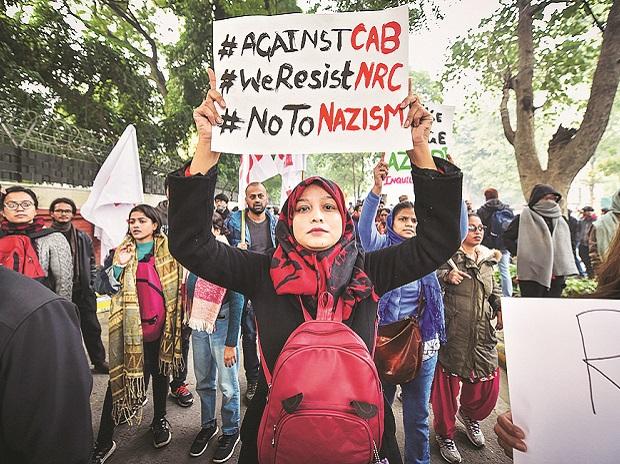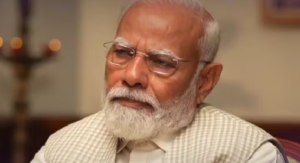G.G. Parekh, Neeraj Jain
The ruling Modi–Shah duo led BJP government’s attempts to make alternations in the Indian Constitution have sparked off protests across the country, protests which are unique in the sense that it is the first time since Independence that people are coming out on the streets to defend the Constitution. In cities and towns, tens of thousands and sometimes even lakhs, are marching together, the tricolour waving in abundance, and small and huge photographs and cut-outs of Babasaheb Ambedkar and Mahatma Gandhi and drawings of the Constitution being carried aloft. The Preamble to the Constitution, a beautifully written promise of what the people had resolved and promised to give to themselves, in the new era of hope after the hated British rulers were thrown out, is being read out in huge gatherings. Indeed, the Republic is being reborn.
For long, the ruling BJP and its parent which rules from behind the screens, the RSS, have been slowly chipping away at the values of the Constitution. They have sought to destroy the secular fabric of the country and deepen the communal divide, with campaigns such as ghar wapsi and love jehad, leading to frenzied mobs lynching innocent Muslims allegedly for cow slaughter. They have attacked democracy and freedom of expression by launching a vicious offensive to attack all ideologies and progressive forces seeking to challenge their fascist ideology, labelling them as anti-nationals and getting a docile police force to arrest them under false charges of sedition. The rights of dalits and adivasis, guaranteed under the Constitution, are under attack. The BJP–RSS are seeking to destroy our universities by foisting persons whose sole qualification is their Hindutva leanings as their heads, and getting goons to attack all dissenting voices. They have systematically hollowed out or subverted all constitutional bodies ranging from the Supreme Court to the Election Commission. The economic architecture built for self-reliance and economic sovereignty, so assiduously built over the past decades, is being dismantled.
There were protests across this gradual subversion of the Constitution in several states. But these were episodic, scattered and drowned out by the hegemony of the Modi-led government with its powerful propaganda machine and populist appeals.
With economic distress worsening, and the government not doing anything about it while seeking to divert attention by false slogans of ‘nationalism’ and pointing fingers at Pakistan for everything going wrong, the final straw was the BJP bulldozing the Constitutional Amendment Bill through Parliament using its brute majority. It fast tracked the granting of citizenship to members of six religious communities but not to Muslims. It was immediately seen for what it really was—an open subversion of the Constitution, which not only upholds secularism, but also equality of all, irrespective of caste or creed, before law. Modi–Shah also announced a countrywide NPR as the first step to making a countrywide register of citizens (NRC). This had already been implemented in Assam, with disastrous consequences. It became clear to people all over the country—that our Constitution and our country were under attack.
It has led to unprecedented protests across the country against the CAA–NPR–NRC. The youth, especially students of universities, have been leading these protests. It is as if democracy is having a rebirth in the country. Till just a month ago, democracy had come to mean mere voting in elections. And now, people are out on the streets, in thousands and lakhs, reclaiming democracy. In cities and towns, people, especially women who have never participated in a public programme, are spending days and nights together in a new found sense of fraternity and purpose. In a historic moment, on January 26, thousands of people congregated at Shaheen Bagh in Delhi to celebrate Republic Day. The National Flag was unfurled by the three elderly women who have come to be known as the ‘dadis of Shaheen Bagh’ for leading the agitation against the CAA there, and Radhika Vemula, the mother of Rohith Vemula, a former student of the University of Hyderabad who killed himself in January 2016; after the flag hoisting, the crowd sang the national anthem. They then chanted “CAA se azaadi, NRC se azaadi, BJP se azaadi”—along with other slogans against the CAA and the NRC–NPR.
What is exhilarating is that the Muslim minority is out on the streets in massive numbers, carrying Ambedkar’s photo in one hand and waving a copy of the Constitution in the other, shouting slogans of ‘Samvidhaan Bachao’. They are boldly asserting their citizenship, boldly asserting their identity as Indian Muslims, boldly declaring that their forefathers had sacrificed their lives for the freedom of this country and none can ask them to ‘go to Pakistan’, boldly defending the secular nature of our Constitution and denouncing the RSS claim that this country is a Hindu country.
Even more fascinating is that the public gatherings in defence of the Constitution have brought out thousands of women from the Muslim community. This too was unheard of till now. Their indomitable spirit, their resolve and most of all, their understanding of the Constitution is breathtakingly lucid. It is as if a hidden treasure of diamonds has been revealed in this struggle.
The dream of Mahatma Gandhi, for which he sacrificed his life, is coming alive. Secularism is having a rebirth in the country.
This is indeed a unique constitutional moment in the life of the Indian nation. In the 163 years of evolution of the Indian Constitution, this is the fourth such moment. The first three moments were:
- The first moment appeared in 1857 in the besieged city of Delhi when the rebellious soldiers along with representatives of the city formed the Court of Administration and had given the city a “constitution”, outlining the structure of governance and responsibilities of administration. The rebel soldiers were the first citizen-rulers—members of an incipient nation.
- The second moment came in 1928–29, beginning with the report of the Nehru Committee (chaired by Motilal Nehru and with members such as Jawaharlal Nehru and Subhas Chandra Bose), the widespread demonstrations in 1928 against the Simon Commission, culminating in the declaration of Purna Swaraj by the Indian National Congress in 1929 in Lahore. Founding a republic was declared as the goal.
- The third moment is known to all. It was the moment of founding the constitution of independent India (1946–49).
The fourth, and present, moment, is different from all the above moments in that it is for the first time since the Consitution was adopted by ‘We the People’ that the streets, campuses, squares, towns and cities, tea shops, clubs and assemblies are discussing and debating the Constitution, and the people are out on the streets in massive numbers to defend the very founding values of the Indian Republic as enshrined in the Constitution of India.
We are indeed living in exhilarating times!




